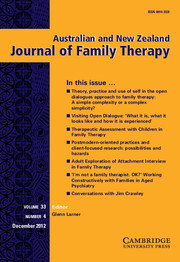Crossref Citations
This article has been cited by the following publications. This list is generated based on data provided by
Crossref.
Carr, Alan
2011.
Thematic review of family therapy journals 2010.
Journal of Family Therapy,
Vol. 33,
Issue. 4,
p.
429.
Rhodes, Paul
2011.
Integrating Family Therapy Training in a Clinical Psychology Course.
Australian and New Zealand Journal of Family Therapy,
Vol. 32,
Issue. 2,
p.
124.
Habib, Cherine
2011.
Integrating Family Therapy Training in a Clinical Psychology Course.
Australian and New Zealand Journal of Family Therapy,
Vol. 32,
Issue. 2,
p.
109.
Fraser, Mark W.
Guo, Shenyang
Ellis, Alan R.
Thompson, Aaron M.
Wike, Traci L.
and
Li, Jilan
2011.
Outcome Studies of Social, Behavioral, and Educational Interventions.
Research on Social Work Practice,
Vol. 21,
Issue. 6,
p.
619.
Rhodes, Paul
2012.
Nothing to Fear? Thoughts on the History of Family Therapy and the Potential Contribution of Research.
Australian and New Zealand Journal of Family Therapy,
Vol. 33,
Issue. 2,
p.
171.
Ferrer-Wreder, Laura
Sundell, Knut
and
Mansoory, Shahram
2012.
Tinkering with Perfection: Theory Development in the Intervention Cultural Adaptation Field.
Child & Youth Care Forum,
Vol. 41,
Issue. 2,
p.
149.
2013.
Riconoscimento dell'efficacia della psicoterapia.
PSICOTERAPIA E SCIENZE UMANE,
p.
407.
Asscher, Jessica J.
Deković, Maja
Manders, Willeke A.
van der Laan, Peter H.
and
Prins, Pier J. M.
2013.
A randomized controlled trial of the effectiveness of multisystemic therapy in the Netherlands: post-treatment changes and moderator effects.
Journal of Experimental Criminology,
Vol. 9,
Issue. 2,
p.
169.
Stewart, Shannon L.
Leschied, Alan
den Dunnen, Wendy
Zalmanowitz, Sharla
and
Baiden, Philip
2013.
Treating Mental Health Disorders for Children in Child Welfare Care: Evaluating the Outcome Literature.
Child & Youth Care Forum,
Vol. 42,
Issue. 2,
p.
131.
Williams, Javonda
and
Nelson-Gardell, Debra
2014.
Mentoring up-cycled: creating a community-based intervention for sexually abused adolescents.
Journal of Children's Services,
Vol. 9,
Issue. 3,
p.
235.
Asscher, Jessica J.
Deković, Maja
Manders, Willeke
van der Laan, Peter H.
Prins, Pier J. M.
and
van Arum, Sander
2014.
Sustainability of the effects of multisystemic therapy for juvenile delinquents in The Netherlands: effects on delinquency and recidivism.
Journal of Experimental Criminology,
Gonzales, Nancy A.
Lau, Anna S.
Murry, Velma M.
Pina, Armando A.
and
Barrera,, Manuel
2016.
Developmental Psychopathology.
p.
1.
Perumbilly, Sebastian A.
Anderson, Stephen A.
and
Boylin, William M.
2017.
Parents’ Personal Growth: Expanding the View of Therapy for Child Behavioral Problems.
Journal of Family Psychotherapy,
Vol. 28,
Issue. 1,
p.
59.
Graaf, Genevieve
and
Snowden, Lonnie
2017.
The role of Medicaid home and community-based service policies in organizing and financing care for children with severe emotional disturbance.
Children and Youth Services Review,
Vol. 81,
Issue. ,
p.
272.
Ang, Rebecca P.
Huan, Vivien S.
Li, Xiang
and
Chan, Wei Teng
2018.
Functions of Aggression and Delinquency: The Moderating Role of Parent Criminality and Friends’ Gang Membership.
Journal of Interpersonal Violence,
Vol. 33,
Issue. 22,
p.
3531.
Prowell, Ashley Nicole
and
Williams, Javonda
2021.
Mentoring as a protective factor: Exploring its impact on childhood sexual abuse survivors.
Children and Youth Services Review,
Vol. 128,
Issue. ,
p.
106169.




